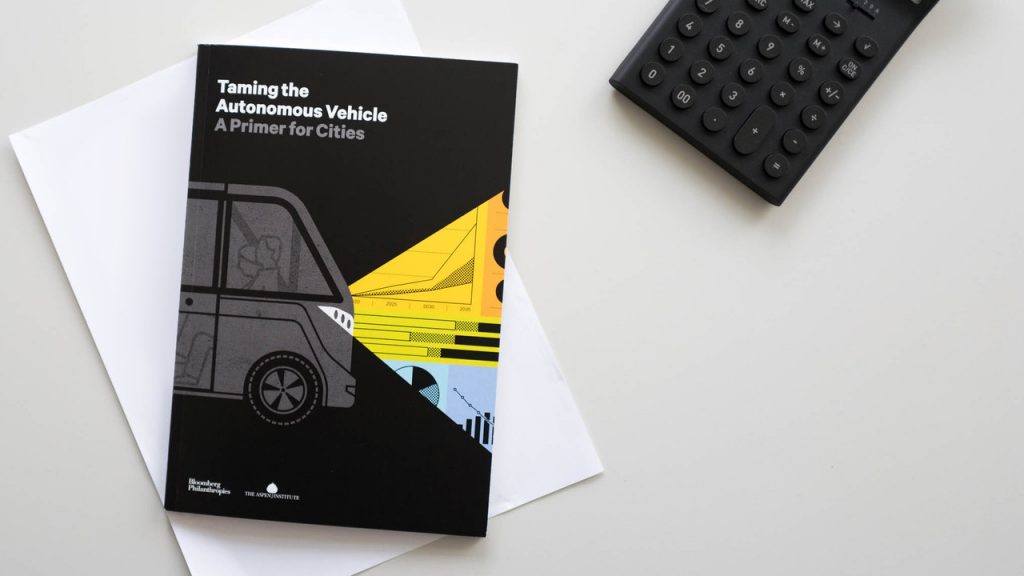Six Things Cities Need to Know About the Future of Autonomous Vehicles

By Anthony Townsend
Wired magazine named 2016 “the year of autonomous driving,” and CNN says we’ve reached “a tipping point for excitement in self-driving cars.” But too much attention has been on the vehicles themselves – the driverless cars, automated minibuses, adorable delivery bots, and high-efficiency trucks. The real story is how much Autonomous Vehicles could change the way we live and the shape of our communities in the coming decades.
Cities will be the main stage where this AV revolution plays out. Inexpensive, efficient, and flexible mobility made possible by AVs could transform urban economies, restructure the shape of neighborhoods and regions, and change the way cities respond to complex challenges, from aging populations to economic disenfranchisement. The impacts could be as far-reaching as those fostered by the automobile a century ago.
That’s why it’s so important for cities to start leading the shift to AVs now. And it’s why over the course of 2017, Bloomberg Philanthropies and the Aspen Institute will bring mayors and senior leaders from 10 cities together with leading industry and policy experts to help cities do just that.
The AV transition poses many urgent questions for cities. When will autonomous vehicles arrive in significant numbers? What types will take off first? Where will the hotspots of AV use be? Who are the key players in this new industry and what do they want from cities? How can cities assess the risks and opportunities and act strategically to maximize the potential benefits and minimize negative impacts? With the future of two of the world’s largest industries hanging in the balance – cars and computers – there’s no shortage of speculation on where AVs may take us. But where can cities turn for insights?

To give cities a head start in understanding what the AV transition could mean for them, we have combed through a growing body of research and opinion. To help cities proactively and strategically prepare for the accelerating shift to autonomous vehicles, we have distilled the following key insights for mayors and other city leaders:
-
There is a narrow window to shape the spread of AVs.
AVs will spread slowly at first, but as costs fall, they will spread even faster than the automobile in the 20th century. Cities could fall behind quickly.
-
Automation is changing the automobile, mostly in ways that will help cities.
AVs can take many more forms and perform different functions than today’s cars and trucks, creating new opportunities to right-size vehicles and fleets for urban use.
-
Automated highways are an obsolete vision.
City driving will be a tough technical challenge with enormous payoff for industry. Today’s focus on highway trials will rapidly shift to real-world urban testbeds.
-
AVs are a vital technology for enabling populations to age in place.
By 2030, the world will be home to more than 1.4 billion people age 60 or over, a trend that will dominate how the AV market evolves.
-
Cities have an opportunity to focus private sector AV innovation on urban challenges.
Cities will be key battlegrounds between the tech industry and traditional automakers. The public sector will need to find ways to leverage assets including land, infrastructure, data, and talent to focus companies on needs of cities and all of the people who live in them.
-
The implications of AVs will cut across every facet of government, society, and the economy.
Cities that only focus on AVs through transportation planning and regulation won’t succeed in leveraging AVs’ potential while avoiding their unintended consequences. Cities need to tap many sources of expertise inside and outside of government.
The full publication, “Taming the Autonomous Vehicle: A Primer for Cities,” explores these topics in depth and synthesizes a broad array of data and expert opinion through a consensus view of AV trends that cities need to understand.
Successfully integrating AVs into urban neighborhoods and ensuring that their benefits outweigh the potential risks will require cities, automakers, and tech companies to work together. And Bloomberg Philanthropies and the Aspen Institute will be supporting that work throughout this year.
Dr. Anthony Townsend is a transportation expert and is supporting the Bloomberg Aspen Initiative on Cities and Autonomous Vehicles.